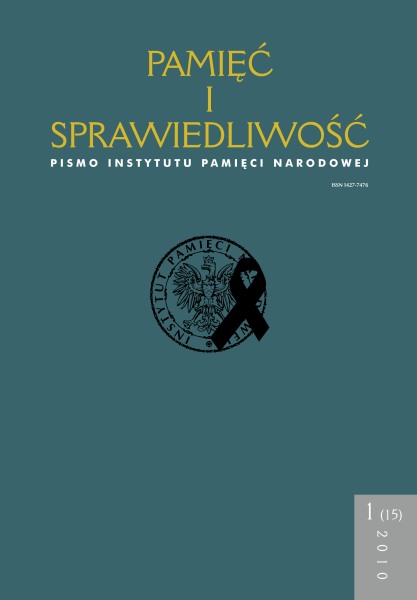Konrad Sieniewicz w dokumentach bezpieki
Pamięć i Sprawiedliwość, Tom 15 Nr 1 (2010), strony: 89-116
Data publikacji: 2010-06-30
Abstrakt
Konrad Sieniewicz was one of the most prominent characters of the Polish emigration Christian Democracy (Chadecja). He was one of the closest collaborators of Karol Popiel. Sieniewicz was also active in the international Christian Democratic movement and for many years was the secretary general of the Christian Democratic Union of Central Europe (UCDEC – Chrześcijańsko-
-Demokratyczna Unia Środkowej Europy) and of the World Christian Democratic Union (Światowa Unia Chrześcijańsko-Demokratyczna). In December 1945, he
left Poland threatened with arrest. The security department continuously monitored his activity and regarded him as spiritus mo-vens of the Labour Party foreign centre and also as the main organiser of the actions aimed at the country. The attempts to get closer to Sieniewicz, which were conducted in the middle of the
fifties by the Secret Police, were successful during the summer of 1957. Contact was established and was, for many years, sustained by comrade “Borowski”, one of Sieniewicz’s closest friends during war who played a key role in revealing the Labour Party’s environment in exile and in the country. Despite obstinate
signals about Sieniewicz’s connections with American services, his reports eventually persuaded the intelligence to conduct attempts to recruit the Christian Democrat, who was now code named “Insula”. In the autumn of 1963, fundamental talks took place in Italy. Sieniewicz consciously decided to establish contacts with the Secret Police: however, he wanted them to be a political dialogue. Sieniewicz expected an agreement to the revival of any activity of the authentic Christian Democratic movement in the country in exchange for cooperation with Warsaw authorities in the territories recognised by the emigration as consistent with the Polish raison d’etat. In February 1966, after a few meetings, Sieniewicz suspended contact when he realized that the interlocutors did not want to treat him as a partner. They treated him only as a spy, a source of information. Two years later, the intelligence’s attempt to resume talks was unsuccessful.
In the autumn of 1970, “Insula’s” surveillance was formally finished, however, the security department was still interested in his activity. In Sieniewicz’s game with the Secret Police, he did not achieve any of the assumed aims. His case illustrates well the attitude of the Security Service towards emigrants. Even those who were eager to search a modus vivendi with the Warsaw government were treated suspiciously and were used in an instrumental manner. The People’s Republic of Poland offered them only the role of informant for the secret services. In such conditions, all the emigrants’ attempts to conduct real dialogue with the communist authorities were doomed to fail.
Inne teksty tego samego autora
- Sławomir Łukasiewicz, Paweł Machcewicz, Paweł Sasanka, Paweł Ziętara, Rok 1956 - 60 lat później. Dyskusja z udziałem Sławomira Łukasiewicza, Pawła Machcewicza, Pawła Sasanki, Pawła Ziętary , Pamięć i Sprawiedliwość: Tom 28 Nr 2 (2016)
 Język Polski
Język Polski
 English
English
 Deutsch
Deutsch
 Français (France)
Français (France)
 Italiano
Italiano
 Русский
Русский


 PDF
PDF
